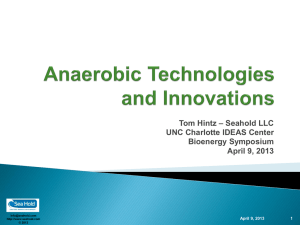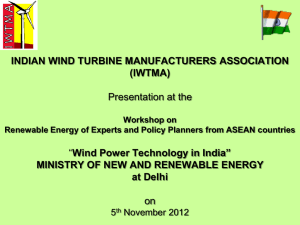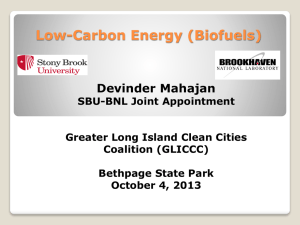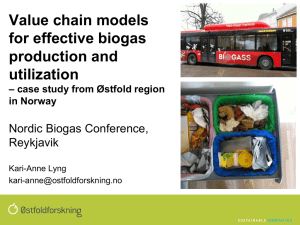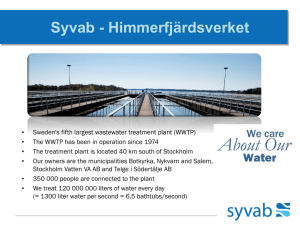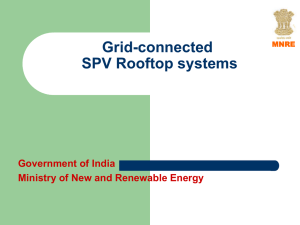see - Ministry of New and Renewable Energy
advertisement
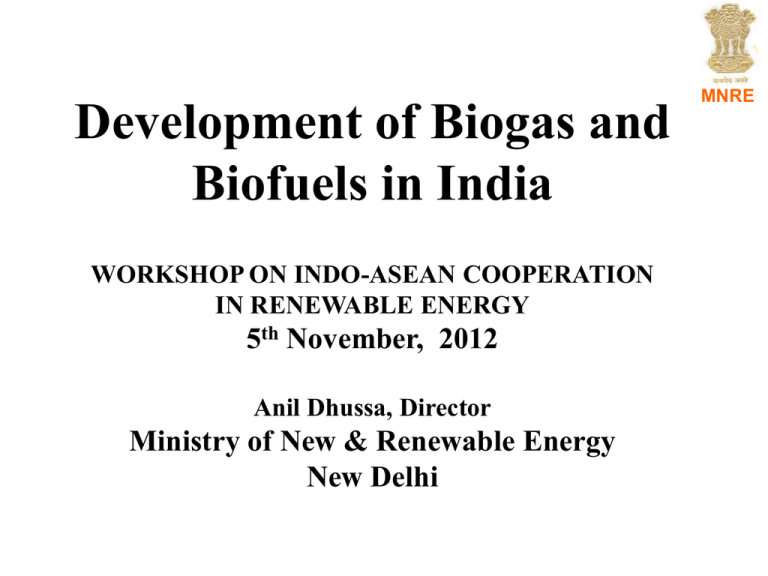
Development of Biogas and Biofuels in India WORKSHOP ON INDO-ASEAN COOPERATION IN RENEWABLE ENERGY 5th November, 2012 Anil Dhussa, Director Ministry of New & Renewable Energy New Delhi MNRE Bioenergy Options o o o Biomass Combustion / Co-generation Improved solid fuels (Pellet, Briquettes, Char) Gaseous Fuels - o MNRE Bio-chemical / Bio-methanation (Biogas) Thermo-chemical (Producer Gas) Liquid Fuels - Extraction (Trans esterification / biodiesel) - Thermo-Chemical (Pyrolysis Oil) Bio-chemical (Ethanol, Butanol) Biomethanation MNRE o Biomethanation / Anaerobic Digestion (AD) has emerged as a mature technology for energy from animal and agro-industrial wastes / residues, biomass and energy crops o Large Potential of energy recovery from above substrates and treatment & disposal of wastes Bio-energy Resources in India MNRE Agricultural residues / energy crops o Over 140 M ha arable land is estimated to produce over 700 MTA biomass o 50 M ha arable land is under mono cropping - potential for short cycle cellulosic biomass. Cattle dung and Poultry droppings o o 1000 MTA from 300 million cows & buffaloes. 8 MTA from 500 million poultry birds. MSW o By 2021 urban population likely to be 550 mil - would generate > 150 MTA of MSW Potential in India o Surplus biomass : o Cows manure : and poultry droppings 17000 MW 1500 MW o Urban Wastes : 2600 MW o Industrial Wastes : 1300 MW Benefits of Biogas Technology MNRE o Biomethanation (AD) produces energy and treats waste o Contributes to energy security through use of local resources o Produces superior organic manure - Industrial AD Plants can produce assured quality organic fertilizer for improving profitability o De-centralised application for segregated organic wastes help to reduce landfills Biogas from Industrial wastes Likely Capacities o o o o o o Distilleries effluent : Dairies (milk processing) : Paper Mills (Black Liq. +) : Slaughterhouse waste : Poultry droppings : Cattle dung : 1 MW / 30 kL 100 kW / 3 lakh litres 1 MW / 60 TPD paper 100 kW / 10-12 TPD 1 MW / 1 Million birds 100 kW / 25 TPD Biogas in India MNRE o 4.5 M Household biogas plants based on cattle manure mainly for producing cooking fuel o Mid sized biogas plants based on cattle manure and other similar wastes for heat, electricity or motive power o Biogas from urban and industrial wastes and effluents o Co-digestion of farm / agricultural residues with urban and industrial wastes Biogas from Animal Manure and Agro-residues o 1 MW and 1.2 MW Cattle manure based biogas projects at Ludhiana, Punjab and Jabalpur, MP o About 2000 small and medium size biogas plants based on cattle manure for heat, electricity or motive power (5-25 kW) o 1.5 and 2.5 MW biogas projects based on poultry droppings in Tamil Nadu o Two projects of 4 MW each for agricultural wastes / residues in Punjab under installation o MNRE Biogas from Industrial Wastes MNRE o 1.5 MW power from food processing and sugar industry solid waste o Four biogas projects for bagasse / straw washwater in paper mills o About 20 projects for heat and/or power from starch industry effluents o Over 250 distilleries generating biogas for heat and/or power from their spent wash/effluent o Demonstration projects for converting biogas into bio-CNG MNRE Biogas Plant Designs Top: Floating drum Bottom:Fixed dome Global Methane Initiative – Meeting of Agr. Sub-Committee November 12, 2010 MNRE 1.0 MW power project based on cattle dung at a Dairy Complex Ludhiana, Punjab MNRE 1.2 MW power project based on cattle manure at Dairy Colony in Jabalpur Global Methane Initiative – Meeting of Agr. Sub-Committee November 12, 2010 MNRE Biomethanation of bagasse wash-water at Tamil Nadu Newsprint and Papers Company Global Methane Initiative – Meeting of Agr. Sub-Committee November 12, 2010 MNRE 3000 cum biomethanation project for solid waste at Slaughterhouse in Andhra Pradesh Global Methane Initiative – Meeting of Agr. Sub-Committee November 12, 2010 MNRE 2 MW biogas power at a distillery Kitchen waste biogas plant MNRE Government Support for Biogas Programme o o o o Financial and fiscal support Provisions in the Electricity Act 2003 - Open access to grid for RE power - Preferential tariffs by State regulators - RE Power Obligations for Transcos Capacity building measures Support for Research and Development MNRE Biofuels in India MNRE o o o o 1st generation Biofuels - From molasses – bio-ethanol - From oil bearing seeds (SVO and biodiesel) 2nd generation Biofuels: ligno-cellulosic substrates - Ethanol through enzymatic fermentation - bio-crude, bio-oil (Thermo-chemical route) 3rd generation Biofuels - Algae, green diesel 4th generation Biofuels: CO2 sequestration ……. National Biofuel Policy MNRE o Announced in December, 2009 o Development and utilization of indigenous nonfood feedstocks raised on degraded or waste lands o Thrust on research and development on cultivation, processing and production of biofuels o 20% Ethanol and Bio-diesel blending by 2017 – current target is 5% blending – achieving ~ 2% Some Recent Initiatives MNRE o o Identified quality germ-plasms of Jatropha and assessed their availability for multiplication Facility for large scale micro-propagation of elite Jatropha genotypes under development o Demonstration projects on promising genotypes taken up o Major thrust on R & D on 2nd Generation Biofuels Pilot projects set up o Initiatives taken by Industry MNRE o Private and Public sector industry active in R&D, Plantation of oilseed bearing trees and production of bio-diesel and bio-ethanol o 10 bio-diesel plants set up with capacities ranging from 30-1600 TPD and aggregating to 3080 TPD. o This production capacity can replace over 2% of the current diesel demand. o Slowdown as adequate feedstock not available MNRE THANK YOU akdhussa@nic.in www.mnre.gov.in


